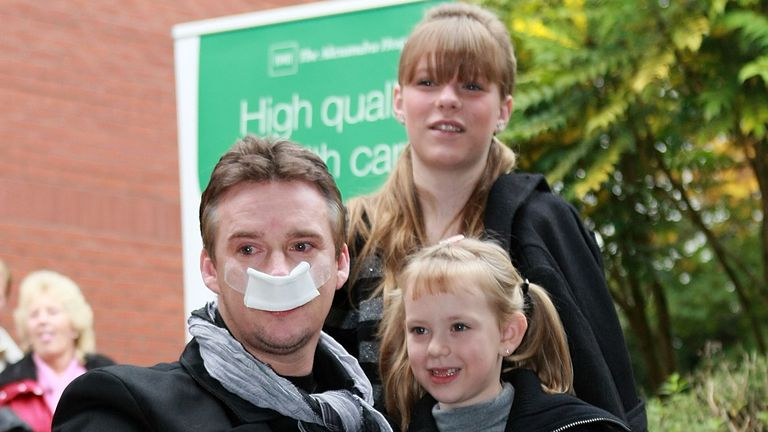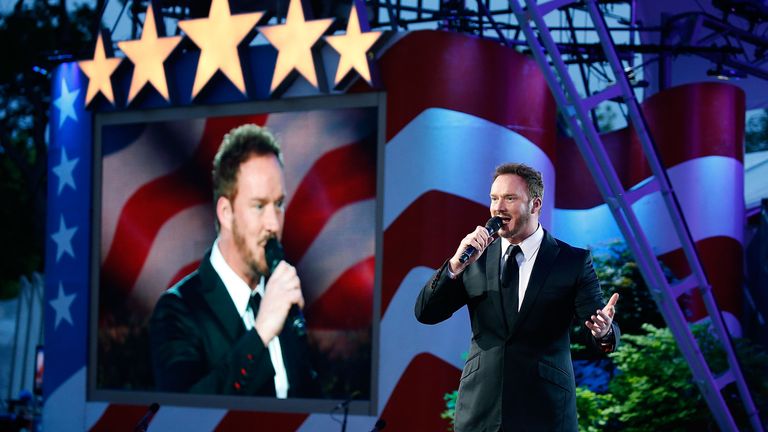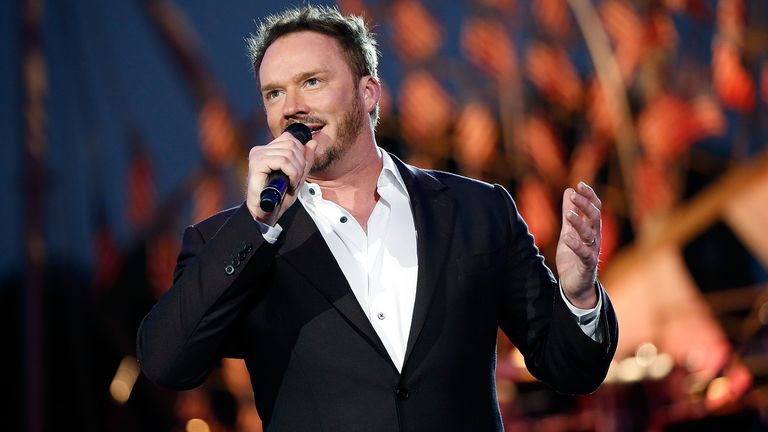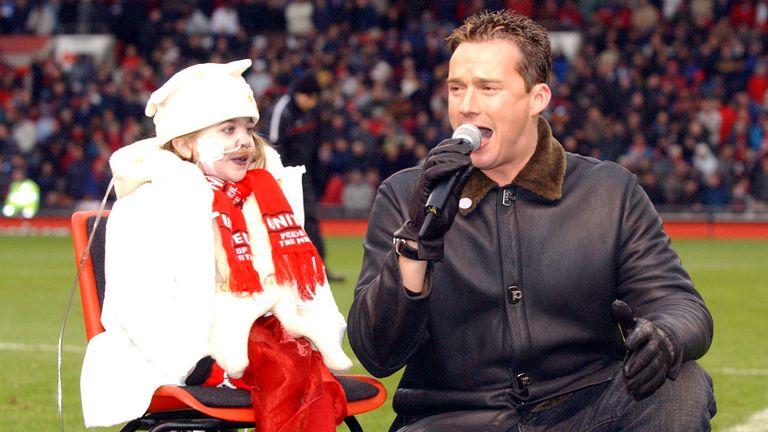“He’s not what he used to be, is he?”
That was the overheard comment, during a performance following his second brain tumour, that led Russell Watson to push his voice to new limits.
With three decades in the industry and multiple awards, the 53-year-old singer tells Sky News it feels “like two lifetimes ago” he first set foot in the recording studio alongside the Pheromonic Orchestra back in 1999.
His rags to riches story – which he describes as “Billy Elliot with bells on” – is nothing short of miraculous.
Watson went from playing attic rooms in backstreet clubs in Ellesmere, lugging all his equipment into the venue on his own to find just three people waiting for his show, to headlining Wembley Arena in front of 15,000-strong crowds.
It’s no surprise he’s had “serious conversations” with producers about turning his journey from working in a nuts and bolt factory in Salford to playing the most esteemed venues in the world.
At one point in his career Watson was such a fixture performing on the sporting scene that a journalist commented he was the only person to have appeared more regularly at Wembley than David Beckham.
While he’s performed for both the Queen and Pope John Paul II, he says his most surreal audience was Emperor Hirohito of Japan at the Imperial Palace in Tokyo.
An avid Manchester United fan, the emperor was keen to spend the evening talking football tactics.
As for collaborations, Watson’s childhood icon Lionel Ritchie, was a “real gentleman”, Meatloaf was “larger than life” and a fan of the brandy and as for singing with former Beatle Paul McCartney at the Nobel Peace Prize awards – all Watson can say is, “oh what a night”.
He admits it sounds like he’s led a charmed life – but it’s had its challenges.
“It is a fairy-tale scenario, but the Wicked Witch of the West turned up at the party along the way and cast a couple of spells on me.”
After the shocking diagnosis of a brain tumour in 2006, for which he was successfully treated, Watson faced a second tumour in 2007, when a sudden regrowth led to bleeding in his brain.
He explains: “It was dangerous because the tumour grew very quickly. I went to bed one night and it haemorrhaged while I was asleep.
“I was lucky to survive… They literally said to me a few minutes more and I’d have been dead.”
The dad-of-two says it changed his outlook on life: “If I consider my mortality, there isn’t one day when I don’t think about my life and am not incredibly grateful for the fact that I’m still here.”
He underwent five weeks of intense radiotherapy following the relapse and says it took him two or three years to come back from it.
Always conscious of his appearance, dressing well and staying trim, Watson says all that was stripped away after his second operation.
“I was a mess. My hair had all fallen out in lumps, I ballooned to 18 or 19 stone because of the steroids I was taking. I looked in the mirror and I was almost unrecognisable.”
He says it was hard, after hardly having suffered a day’s illness in his life prior to the tumours, to have it all come crashing down around him. And the toll was emotional as well as physical.
“My confidence had been absolutely shattered. Getting back on stage and singing in front of thousands of people again was a big ask.”
While the fear that the tumour could ruin his voice was real – the surgeon had to remove the tumour through his nose – Watson knew he had to face more important battles than that.
“I was more worried about whether I’d see another day than whether I see another theatre.”
Thankfully, he was able to return to performing after intense vocal rehabilitation, but it took time and determination.
One early show particularly sticks in his mind as a milestone on his journey.
It was while performing a gig he’d tailored specially around his changed voice that Watson heard the comment about him being “not what he used to be” made by a man in the second row to his partner.
Rather than crumble, it became the catalyst for getting his voice back to full strength.
“I thought, I’ll show you! And I went away, and I worked my arse off to rebuild the infrastructure of my voice, just because of what that one guy said.”
It’s that attitude that has helped Watson remain a constant in the notoriously fickle world of showbiz and come back from every pitfall life has thrown at him.
While he says turmoil can inspire a “why me?” attitude in some, he feels he’s one of the lucky ones who has counted his blessings following his illness.
As he puts it: “There’s nothing like a near-death experience to put you in tune with your own spirituality and everybody around you.
“If someone had said, ‘Would you like two great big lumps in your head?’ I’d have said, ‘No, I wouldn’t’.
“But now, 13 years on, I feel like the person I am today is partly down to the battles I’ve had to face and it’s the fabric of who I am now.”
Now fighting fit, taking 23-mile bike rides and two-hour games of tennis in his stride, he’s moved on from what the tabloids dubbed his “tumour hell” and is feeling good.
“If it all came to an end tomorrow, I’ve got so many fantastic memories and I’ve achieved so many things that when I first started out in 1990, I would never have expected to have done. What a life and career I’ve had.”
It’s 20 years since his debut album – The Voice – which became the bestselling classical album of this century, he’s now about to release his 14th studio record.
Its production took social distancing to a whole new level, with Watson singing in Wilmslow, Cheshire, while the orchestra and conductor performed in Christchurch, New Zealand.
And while coronavirus has forced a delay on his touring plans, he’ll be back on the road again in 2021.
:: Subscribe to the Backstage podcast on Apple Podcasts, Google Podcasts, Spotify, Spreaker
For a man who started out performing in working men’s clubs in in North West England, the struggle of small venues during the pandemic is something very close to his heart.
“If things carry on as they are, we’ll be seeing a lot of venues closing down. Government grants only go so far, and it’s the smaller venues that get forgotten…
“Thousands of musicians rely utterly on the industry – sound engineers, crew, drivers, lighting technicians, promotors and producers – and they’re out of work. They have no idea what the future holds for them and it’s frightening.
“You can go into a supermarket packed to the rafters on a Saturday afternoon, but we have no idea when we can go back on the stage again. I’m not saying it’s the right time now, but there has to be a plan in place to help people, but it just seems like it’s being brushed under the carpet.”
As for his own postponed tour, he admits that when he recently walked into a theatre he got “a twinge of melancholy” that he wasn’t there to sing.
“I just can’t wait to be get out there again and my musicians too, they’re all desperate to get back on the stage.”
Russell Watson’s 14th studio album, titled 20, is released on Friday 23 October and his anniversary tour is scheduled to kick off in Aylesbury in January 2021.





